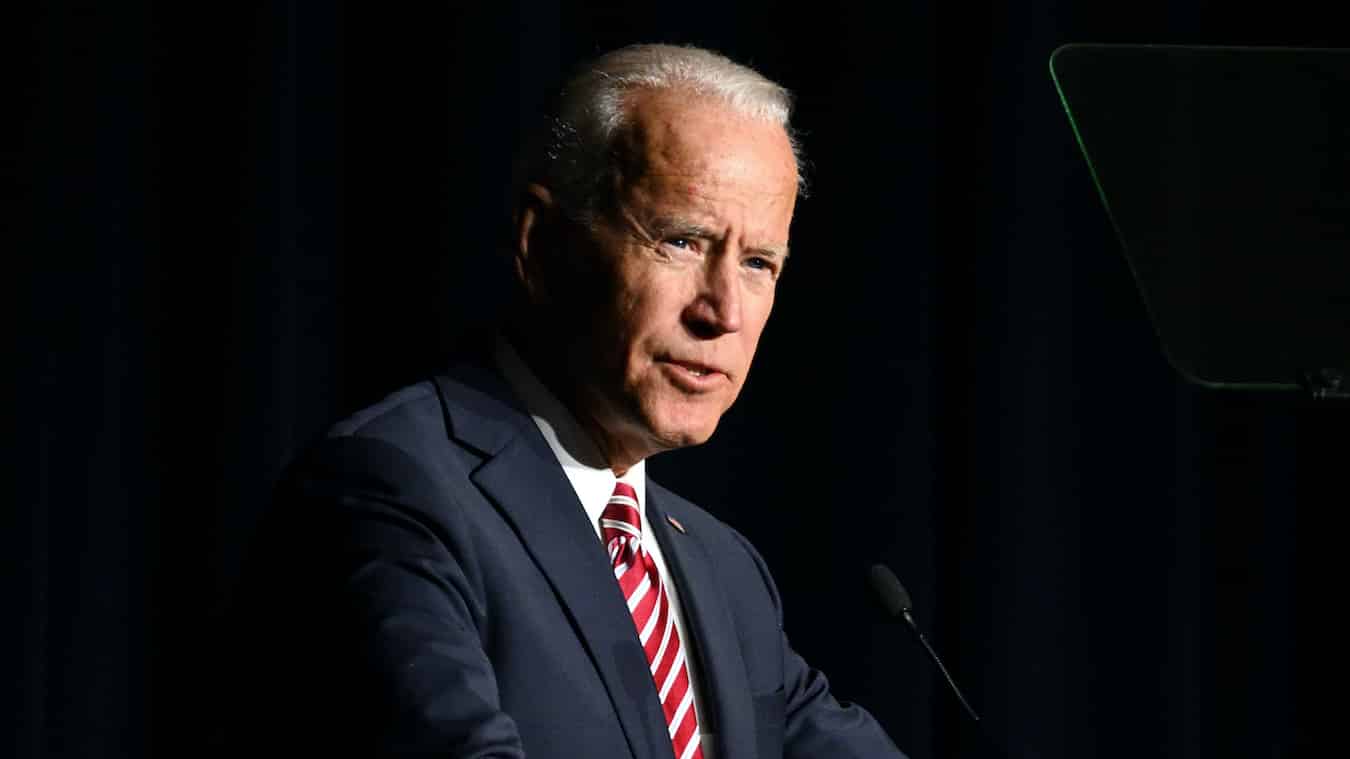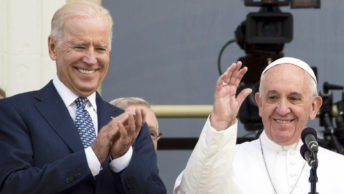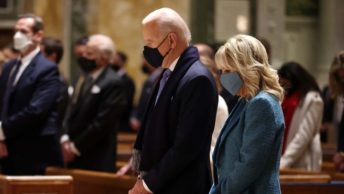The article is titled Trump or Biden? What’s a Catholic voter to do? and the author is Thomas Reese, an accomplished Jesuit priest. Depending in large part on one’s experience with Jesuit writings, one might expect either a profoundly meaningful discussion of the issue or, in contrast, a crafty, evasive, deceptive one. (The latter characteristics are one historical definition of “Jesuitical.”)
The author begins by framing the issue to be discussed: “With the choice of Joe Biden as the Democratic nominee for president of the United States, American Catholics are fighting over whether Biden can be called a Catholic politician. Connected to this question is another: ‘Can a Catholic vote for Biden?’” [Emphasis added]
He then lists six different types of Catholic politician, the differences concerning which Catholic leaders the politician follows—pope, bishops, or neither—and which specific Catholic teachings he/she supports. Biden is classified by the first and simplest of these definitions, “a politician who happens to be Catholic.”
Next, the author proceeds to present a goodly amount of information purportedly relevant to whether a Catholic can vote for Biden. It mentions how many Catholics in Congress are in the same classification as Biden and explains the broad range of sinfulness they can be guilty of while still being appropriately classified as Catholic. He then zooms backward in time to Roman persecutions of Christians, fast-forwards to fear-based opposition to JFK in the 1960 presidential campaign, and then makes a quick back-turn to the anti-Catholic opposition to Al Smith in 1928.
The Depression and New Deal, the author notes, caused many Catholics to become Democrats, but in the aftermath of WWII, many “white Catholics abandoned the party of their parents and became Republican.”
At this juncture, fully a third of the way into the article, the reader has received much information, but none of it addresses “Can a Catholic vote for Biden?”
The author now turns to the Catholic hierarchy, and readers are no doubt more than ready to learn how bishops and the pope should help Catholic voters make election decisions. Alas, what they actually learn is that not much help is likely to occur because the hierarchy are “much too liberal for Republicans” on some issues, and “much too conservative for Democrats” on others.
At this point the author shifts his focus from the hierarchy to the politicians who are seeking to gain or retain office. After suggesting it is virtually impossible for politicians to be “totally in line with the bishops and the pope,” he raises this question: “If hardly any politicians embrace the full spectrum of Catholic social teaching, what is a voter to do?” [Emphasis added]
There is that question again, still tantalizing, still unanswered.
At this point the author takes a different—and quite revealing—tack in suggesting, not what voters should do, but what he believes they actually do:
“Catholic Democrats argue in favor of candidates who embrace most of Catholic social teaching, even if they support the legalization of abortion and gay marriage . . . Catholic Republicans argue in favor of candidates who are against abortion and gay marriage, even if they reject most of Catholic social teaching . . . . “ [Emphasis added]
The structure of this passage is crafty in that it hides the central idea being conveyed. That central idea becomes clear by reading only the bold type. The idea is that Democrat candidates are more faithful Catholics than Republican candidates are. Any such idea requires the support of evidence, of course, so simply embedding it in a cleverly constructed statement is therefore inappropriate and, one could fairly argue, intellectually dishonest.
The author then switches from politicians back to the bishops. (Reminder to readers: the repeated switching of focus is not mine, but that of the author whose article I am analyzing.) He states that the bishops “tried to give voting guidance to Catholic voters in their statement “Forming Consciences for Faithful Citizenship,” from which he quotes two paragraphs and then offers a summary:
“So, a Catholic Republican can vote for Trump, even if his policies promote racism or subject immigrants to subhuman living conditions, as long as the voter’s intent is not to support those positions. And a Catholic Democrat can vote for Biden, even if his policies promote abortions and gay marriage, as long as the voter’s intent is not to support those positions.” [Emphasis added]
This statement is dishonest because it distorts Trump’s positions on race and the treatment of immigrants while stating Biden’s positions fairly. Even worse, it does this in spite of the fact that the bishops’ statement the author is summarizing makes no mention of either candidate’s positions on these matters!
Continuing his discussion of the bishops’ statement, the author says, “First, it is noteworthy that besides abortion, euthanasia, assisted suicide and gay marriage, the bishops also list as ‘intrinsically evil,’ policies ‘deliberately subjecting workers or the poor to subhuman living conditions’ as well as policies promoting ‘racist behavior . . . “ Also noteworthy, he adds, is the bishops’ view that voters may support a candidate whose policy supports an intrinsically evil act if they themselves do not support that policy. He then proceeds to offer his explanation of the meaning of the bishops’ statement:
“Thus, a Catholic Republican might feel impelled to vote for Trump despite his policies promoting racism or subjecting immigrants to subhuman living conditions, because of other morally grave reasons, for example, his opposition to abortion. A Catholic Democrat might feel impelled to vote for Biden despite his position on abortion and gay marriage because of other morally grave reasons, for example, his positions on racism, immigration, global warming and COVID-19.” [Emphasis added]
This passage is the craftiest of the three. It takes the bishops’ view on the issue and grafts onto it something the bishops DID NOT SAY! They said “a candidate who favors.” The author changes that to “Trump” and “Biden.” As if that were not sufficiently unfair, he also paints Trump as, in effect, mortally sinful in his “promoting” of racism and “subjecting” of immigrants to deprivation and Biden as, at worst, venially sinful in taking “positions” on grave matters. (The author does not mention these levels of sin, but they are clearly implied in his choice of words.)
The author then adds this detail: “Most white Catholic Republicans agree with Trump’s treatment of immigrants and most Catholic Democrats agree with Biden that abortion should be legal.” [Emphasis added] This would be unbiased except for the earlier depiction of Trump as acting immorally and Biden as merely holding a viewpoint about something considered immoral. And what does that imply about the supporters of each candidate? Obviously, that the “white Catholic Republicans” approve of immoral actions, whereas the Catholic Democrats merely agree with a philosophical position. Translation: in this case at least, Republicans are immoral, but Democrats are moral.
Catholics already have a long “Be Wary Of” list that includes deceptive advertising, false news, scurrilous demonizing of conservative candidates, the substitution of left-wing and anarchist propaganda for genuine education, and attacks on their Catholic faith. But they need to make room for one more item— pronouncements by Catholic priests and/or prelates that seem credible but on closer inspection are little more than left-wing media tracts wrapped in clerical vestments.
Copyright © 2020 by Vincent Ryan Ruggiero. All rights reserved







